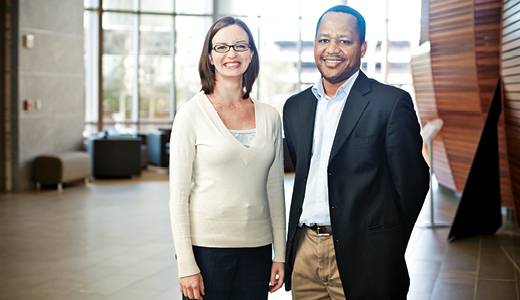In 2011, the Livingston Foundation of Atlanta awarded its first scholarships for PHD students at Rollins.
The foundation gave two new scholarships in 2012 to help Elizabeth Walker 08MPH and Joseph Njau advance their doctoral research.
Walker received a Livingston Fellowship and a C. Randolph Jones Award to support research and development activities related to her studies in behavioral science and health education. Her dissertation considers how family and social support alleviates depression and promotes self-management in people with epilepsy. Her awards helped her purchase a laptop computer with specialized software for data analysis and present her research at the annual conference of the American Public Health Association in San Francisco last fall.
A native of Rochester, New York, Walker taught middle school in Baltimore, Maryland, with Teach for America before enrolling as an MPH student at Rollins in 2006. She plans to become a researcher and teacher after completing her PhD. Her goal: to teach public health courses related to mental health and research methods.
"I am grateful to both donors for supporting doctoral students at Rollins," says Walker. "It really means a lot to us and our research."
Livingston Fellow Joseph Njau of Tanzania agrees. His scholarship enabled him to purchase hardware and software for analyzing data on the economics of malaria. "The computer helped me analyze my data for my first paper, which I recently submitted for publication, and allowed me to begin work on the second and third papers," he says. "I could not have done so without it."
Njau came to the United States as a William H. Foege Fellow in Global Health at Rollins. Established in 2003 with funding from the Bill & Melinda Gates Foundation, these fellowships support students from developing countries who wish to study and network at Rollins. Njau, who will graduate in May with a PhD in health services research and policy, aspires to continue working with institutions and individuals committed to reducing the global burden of malaria and neglected tropical diseases worldwide. Through research and teaching, he plans to increase the number of health economists who focus on diseases of greatest burden in sub-Saharan Africa and Tanzania in particular.
"My experience at Emory couldn't have been better," he says. "I would not have learned this much if I had stayed in Africa, or even Europe, for that matter." Before studying at Rollins, "I could see no relationship between real-life challenges and what I was learning, but here the primary goal is to focus on the problems of today. Learning theory here is geared toward addressing real-life problems. That gives me the confidence to say, ‘Yes, I can do this.' The program challenged me to think and be innovative in finding solutions to current public health problems."

